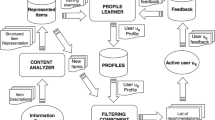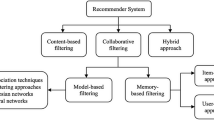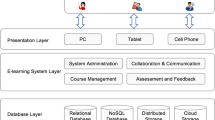Abstract
With the popularization development of MOOC platform, the number of online courses grows rapidly. Efficient and appropriate course recommendation can improve learning efficiency. Traditional recommendation system is applied to the closed educational environment in which the quantity of courses and users is relatively stable. Recommendation model and algorithm cannot directly be applied to MOOC platform efficiently. With the light of the characteristics of MOOC platform, MCRS proposed in this paper has made great improvement in the course recommendation model and recommendation algorithm. MCRS is based on distributed computation framework. The basic algorithm of MCRS is distributed association rules mining algorithm, which based on the improvement of Apriori algorithm. In addition, it is useful to mine the hidden courses rules in course enrollment data. Firstly, the data is pre-processed into a standard form by Hadoop. It aims to improve the efficiency of the basic algorithm. Then it mines association rules of the standard data by Spark. Consequently, course recommendation information is transferred into MySQL through Sqoop, which makes timely feedback and improves user’s courses retrieval efficiency. Finally, to validate the efficiency of MCRS, a series of experiments are carried out on Hadoop and Spark, and the results shows that MCRS is more efficient than traditional Apriori algorithm and Apriori algorithm based on Hadoop, and the MCRS is suitable for current MOOC platform.









Similar content being viewed by others
References
Adomavicius G, Tuzhilin A (2005) Toward the next generation of recommender systems : a survey of the state-of-the-art and possible extensions. IEEE Transactions on Knowledge & Data Engineering 17(6):734–749
Adomavicius G, Zhang J (2012) Stability of recommendation algorithms. ACM Transactions on Information Systems (TOIS) 30(4):23
Aher SB, Lobo LMRJ (2013) Combination of machine learning algorithms for recommendation of courses in E-learning system based on historical data. Knowl-Based Syst 51:1–14
Baker RS (2014) Educational data mining: an advance for intelligent Systems in Education. IEEE Intell Syst 29(3):78–82
Dean BJ, Ghemawat S. (2010) MapReduce: Simpli_ed data processing on large clusters. in OSDI
Dean J, Ghemawat S (2008) MapReduce: simplified data processing on large clusters[J]. Commun. ACM 51(1):107–113
Denley, Tristan. (2013) Degree compass: a course recommendation system."EDUCAUSE review. Online
Gaikwad T, Potey MA. (2013) Personalized course retrieval using literature based method in e-learning system. In Technology for Education (T4E), 2013 I.E. fifth international conference on. 2013: IEEE
García E et al (2011) A collaborative educational association rule mining tool. Internet & Higher Education 14(2):77–88
Hou, Yifan, et al. (2016) Context-Aware Online Learning for Course Recommendation of MOOC Big Data. arXiv preprint arXiv:1610.03147
Kang YQ (2014) An analysis on SPoC: post-MooC era of online education. Tsinghua Journal of Education 35(1):85–93
Li N, et al. (2012) Parallel implementation of Apriori algorithm based on MapReduce. In Acis international conference on software Engineering, artificial intelligence, NETWORKING and parallel & distributed computing
Lin M, Lee P, Hsueh S. (2012) Apriori-based frequent itemset mining algorithms on MapReduce. in Proceedings of the 6th international conference on ubiquitous information management and communication. 2012: ACM
Liu Q, Cai W, Shen J, Zhangjie F, Liu X, Linge N (2016) A speculative approach to spatial-temporal efficiency with multi-objective optimization in a heterogeneous cloud environment. Security and Communication Networks 9(17):4002–4012
Luo Dan, Yunxiang Zheng. (2015) The Research of Online Teaching Pattern Based on MOOC. 2015 International symposium on educational technology (ISET). IEEE
Rendle S (2012) Factorization machines with libfm. ACM Transactions on Intelligent Systems and Technology (TIST) 3(3):57
Romero C, Ventura S (2010) Educational data mining: a review of the state of the art. IEEE Transactions on Systems Man & Cybernetics Part C Applications & Reviews 40(6):601–618
Salehi M, Kamalabadi IN, Ghoushchi MBG (2013) An effective recommendation framework for personal learning environments using a learner preference tree and a GA. IEEE Trans Learn Technol 6(4):350–363
Sarwar B, et al. (2001) Item-based collaborative filtering recommendation algorithms. In Proceedings of the 10th international conference on world wide web. 2001: ACM
Tanai Mirwais, Jongwan Kim, Joong Hyuk Chang. (2010) Data Mining and Educational Decisions. (2010): 260–263.
Wang Y, Tseng MH, Liao HC (2009) Data mining for adaptive learning sequence in English language instruction. Expert Syst Appl 36(4):7681–7686
Wang Y, Tseng MH, Liao HC (2009) Data mining for adaptive learning sequence in English language instruction. J Expert Syst Appl 36(4):7681–7686
Wassan JT (2015) Discovering big data modelling for educational world. Procedia - Social and Behavioral Sciences 176:642–649
Wen M, Rose CP. (2014) Identifying latent study habits by mining learner behavior patterns in massive open online courses. in Proceedings of the 23rd ACM International Conference on Conference on Information and Knowledge Management
West DM, (2012) Big Data for Education: Data Mining, Data Analytics, and Web Dashboards. 2012: Hrvatska znanstvena bibliografija i MZOS-Svibor 11
Yang X, Guo Y, Liu Y et al (2014) A survey of collaborative filtering based social recommender systems. J. Comput Commun 41:1–10
Zhangjie F, Sun X, Liu Q, Lu Z, Shu J (2015) Achieving efficient cloud search services: multi-keyword ranked search over encrypted cloud data supporting parallel computing. IEICE Trans Commun E98-B(1):190–200
Zhou Q (2015) M.C.Y.D., research progress on educational data mining: a survey. Ruan Jian Xue Bao/Journal of Software 26(11):3026–3042 http://www.jos.org.cn/1000-9825/4887.htm
Acknowledgements
This study was funded by the National Programs for Science and Technology Development (grant number 2015BAK07B03), the Priority Academic Program Development of Jiangsu Higher Education Institutions (PAPD), Jiangsu Collaborative Innovation Center on Atmospheric Environment and Equipment Technology (CICAEET), and specific funding for education science research by self-determined research funds of CCNU from the colleges’ basic research and operation of MOE ((grant number CCNU17QN0004)).
Author information
Authors and Affiliations
Corresponding author
Rights and permissions
About this article
Cite this article
Zhang, H., Huang, T., Lv, Z. et al. MCRS: A course recommendation system for MOOCs. Multimed Tools Appl 77, 7051–7069 (2018). https://doi.org/10.1007/s11042-017-4620-2
Received:
Revised:
Accepted:
Published:
Issue Date:
DOI: https://doi.org/10.1007/s11042-017-4620-2




